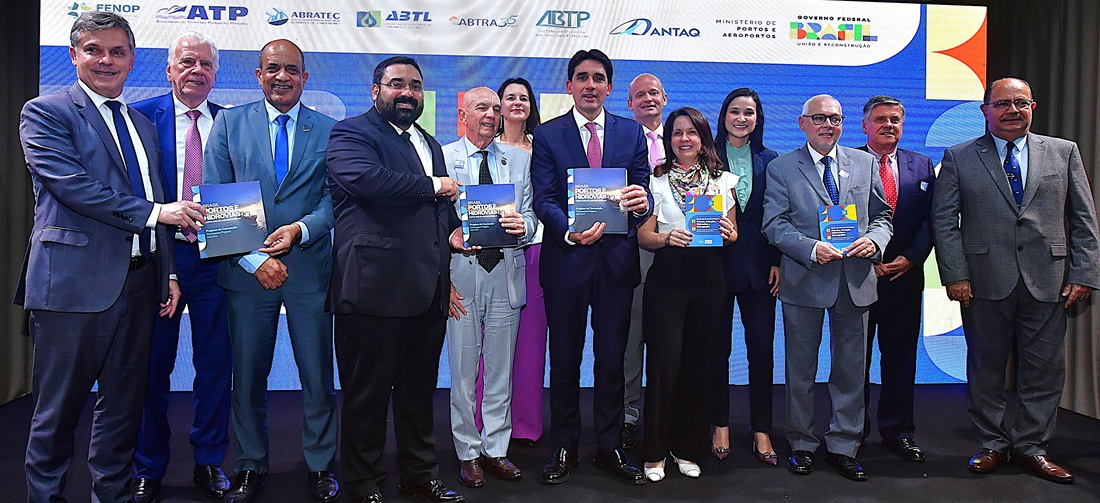
Ministry of Ports Unveils Largest Auction Investment Plan in Brazil’s History
Nov, 28, 2024 Posted by Gabriel MalheirosWeek 202445
On Wednesday (27), the Ministry of Ports and Airports (MPor) announced a strategic investment plan worth R$20 billion for Brazil’s port sector, slated for completion by 2026. Minister Silvio Costa Filho made the announcement at the headquarters of the National Waterway Transport Agency (Antaq) in Brasília. The plan outlines 55 projects, including leases and concessions, alongside a financing guide for port-related initiatives.
For the first time, waterway concessions have been included in the Ministry’s development strategy.
“During President Lula’s four-year term, we aim to hold 55 port sector auctions. To put this into perspective, approximately 45 auctions were conducted between 2013 and 2022. This will secure increased investments and promote modernization and efficiency across our ports, enhancing the competitiveness of Brazilian production and driving the nation’s economic and social development,” said Costa Filho.
The minister also highlighted a 6% growth in the port sector in 2024, with a 15% surge in container operations. “We are working closely with Antaq to accelerate the implementation of these auctions. Since the Port Law, we’ve made significant strides in investments. In 2024 and 2025, we anticipate major auctions at B3, the São Paulo Stock Exchange, to channel robust investments into Brazil’s port infrastructure,” he noted.
The following chart uses data extracted from DataLiner to compare container exports at Brazilian ports from January to September over the past three years. It then compares imports.
Brazilian Container Exports | Jan-Sep 2021 vs. Jan-Sep 2024 | TEUs
Source: DataLiner (click here to request a demo)
Brazilian Container Imports | Jan-Sep 2021 vs. Jan-Sep 2024 | TEUs
Source: DataLiner (click here to request a demo)
According to Alex Ávila, Brazil’s National Secretary of Ports, the country is advancing rapidly in port sector development. “In 2023, we held ten auctions over two sessions, and we plan to close 2024 on a high note with the year’s largest auction, ITG02, scheduled for December 18, involving more than R$ 3.5 billion in projected capital expenditure (Capex),” Ávila announced.
In early 2025, the Ministry plans to auction key port areas in Paranaguá (PR), Santos (SP), and Rio de Janeiro (RJ). These leases and concessions aim to modernize and expand port infrastructure, boosting efficiency and competitiveness.
The government is also promoting competitive credit lines and tax incentives to attract investors and foster sustainable growth in the sector.
Antaq’s Director-General, Eduardo Nery, emphasized the agency’s role in facilitating port terminal leases. “This process requires integrated efforts involving Antaq, the Ministry, and the Civil House’s Special Secretariat for the Investment Partnerships Program. Such collaboration ensures well-structured projects, which help implement our portfolio effectively,” Nery explained.
Financing Initiatives and Incentives
Executive Secretary Mariana Pescatori underscored the importance of financing lines for port investments, particularly through the Merchant Marine Fund (FMM), which will allocate 30% of its resources to the port sector. Priorities include the navigation industry, green shipping initiatives, and gender equity-focused companies.
“We’ve also streamlined the regulatory framework for debentures, reducing the authorization process by three months, which will undoubtedly attract more investment to the sector,” Pescatori stated.
The Ministry introduced a financing guide during the event, detailing credit sources such as the Merchant Marine Fund (FMM), National Civil Aviation Fund (Fnac), Climate Fund, FNE-Proinfra, and BNDES Finem. Specialized instruments for climate adaptation projects, such as the Green Climate Fund (GCF), with a global portfolio of $13.9 billion, were also highlighted.
Risk Mitigation and Guarantees
To attract investments and minimize risks, the government offers guarantees through the Investment Guarantee Fund (FGI) and the Operation Guarantee Fund (FGO). Additional incentives include tax-exempt debentures and the Special Incentive Regime for Infrastructure Development (Reidi).
These comprehensive measures aim to modernize Brazil’s port sector, ensuring its competitiveness in the global logistics landscape while driving sustainable economic growth.
-
Shipping
Mar, 14, 2023
0
Carbon footprint visibility platform promote sustainable logistics
-
Grains
Aug, 18, 2022
0
High prices curb Brazilian wheat exports
-
Meat
Jan, 08, 2025
0
Pork Exports Grow 10% and Set Record in 2024
-
Economy
Jun, 08, 2022
0
Fiscal agents to hold two-day strike over law project


